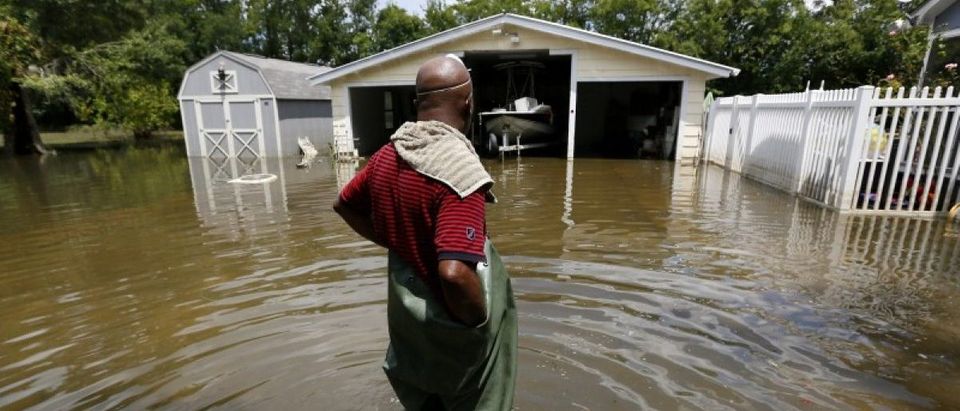The flooding in Louisiana has been nothing short of tragic. The loss of life, the people displaced, and the damages that have permanently altered the lives of the people of Louisiana in the “worst disaster since Sandy” requires a response from Congress that is measured and fiscally responsible.
There is talk on Capitol Hill of implementing supplemental spending for the disaster in Louisiana that may be included in a continuing resolution — a bill instructing the Treasury Department to keep funding the government at current fiscal year levels – which Congress will likely take up in September. Congress has failed once again to pass the 12 spending bills that fund the government and get them to the president’s desk for his signature before the end of the fiscal year on September 30. Therefore, lawmakers will have to pass a continuing resolution when it gets back in September in order to avoid a federal government shutdown.
This may provide lawmakers with an opportunity to add supplemental spending for the Louisiana flooding to the continuing resolution. That would be an example of poor statesmanship. Putting supplemental disaster spending in a continuing resolution to keep the government open would put a great deal of pressure on members of the House and Senate to vote for the measure. Members should be afforded the opportunity to consider the continuing resolution on its merits.
The continuing resolution may be a clean one and simply an extension of current spending, or it may contain harmful policy riders. Anomalies could also be part of the continuing resolution. In the best tradition of Orwellian language, anomalies are provisions made by lawmakers that provide for additional funding of programs, even though that violates the spirit of what a continuing resolution should be. But Capitol Hill is oriented to fueling the status quo with federal dollars, and the opportunity for increasing federal funding is often too easy for lawmakers to pass up.
Adding supplemental funding for the Louisiana flooding to the continuing resolution would make the resolution much easier to pass. That isn’t necessarily a good thing. Passing legislation worth hundreds of billions of dollars should be done in an atmosphere as unrestricted as possible from including additional issues, especially issues as emotionally charged as disaster funding. It is possible that including disaster funding in the continuing resolution would increase the temptation to put policy riders and anomalies in the resolution, since it almost has to pass. This can be mitigated by keeping disaster funding the continuing resolution separate.
Congress should also make sure that any disaster aid provided to Louisiana is offset by cuts elsewhere. When aid for Superstorm Sandy was debated, conservatives in the House tried to get offsets for the massive spending bill to deal with the disaster. They did not succeed, but they did start a vital debate about how disasters should be funded. It set a precedent for future debates like the one the House may face in a few weeks.
Rep. Mick Mulvaney (R-S.C.) had an amendment to the Superstorm Sandy spending bill that would have provided offsets. It was defeated in the House by a vote of 162-258. However, 157 Republicans voted for the amendment, indicating the strong support within the conference for responsible spending and offsets. Every member of the current House Republican team voted for the amendment, except for Rep. Kevin McCarthy (R-Calif.). Speaker Ryan and Rep. Steve Scalise (R-La.) are on the record as supporting offsets for disaster spending. To remain intellectually and legislatively consistent, they must do so again now. Rep. Scalise is in an ideal position to provide a profile in courage by insisting on offsets in the Louisiana funding bill. Too often, members of the House support spending and policy reforms until they impact their own congressional district. Rep. Scalise can help break this gridlock of convenience, and change the way Capitol Hill works, by being a champion for offsets and regular order.
Another strategy being considered is “Packaging the aid for Louisiana with money to address April’s floods in Texas, the June floods in West Virginia or to bolster the money provided to South Carolina last year would give those states’ representatives skin in the game. Locally, an aid package could also include money to recover from the March flooding in part of Louisiana.” This course should not be pursued by Congress. It would represent another attempt to try and push through disaster funding in a way that makes a debate more difficult. These disasters are very different, and the states they impacted have unique challenges different from one another. Each one of these aid proposals should be debated and voted on separately, and not as a package. For the good reasons why there should not be an omnibus appropriation spending package, there should be no omnibus disaster aid package.
Regular order, championed by Speaker Paul Ryan, would argue against combining a supplemental bill with the continuing resolution. The issue of federal aid for Louisiana is too important to make it a pawn in the appropriations battle and politicized by potentially tying to keep the government open. The size of our debt, lack of respect for the Tenth Amendment, and need for regular order in the House, all demonstrate a need for supplemental spending for the disaster in Louisiana, supplemental aid for other disasters, and the continuing resolution to all be debated separately. This would be the best way to address these issues and allow for a maximum level of transparency and adequate time for debate.
Neil Siefring is director of government relations for FreedomWorks. His views are his own. Follow him on Twitter.


